WordPress.com and WordPress.org may sound similar, but they serve different purposes. Many users often wonder why they share the same name and how they are connected.
We have been asked this question repeatedly, so we wrote a detailed comparison of WordPress.com vs. WordPress.org.
Though they operate separately, these platforms share a long history. WordPress.org is the self-hosted, open-source version, while WordPress.com is a hosted service with more managed features.
In this article, we will explore the relationship between WordPress.org and WordPress.com, sharing insights into their origins, how they split, and the ways they continue to collaborate.
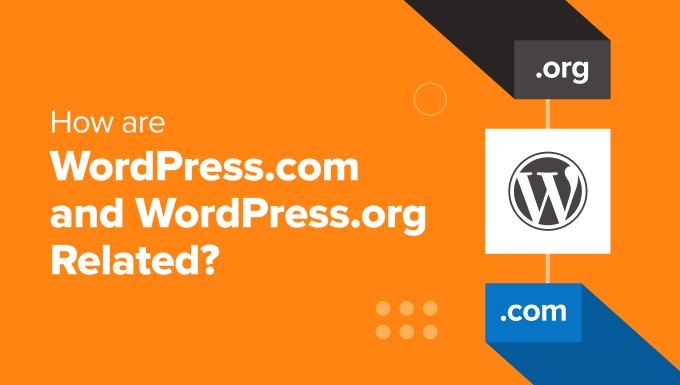
Here is a quick overview of the topics we will cover in this article:
- The Birth of WordPress.org
- The Arrival of WordPress.com
- Ownership of the WordPress Trademark
- What's the Relationship Between WordPress.com and WordPress.org?
- How Does WordPress.org Benefit From Automattic and WordPress.com?
- How Do Automattic and WordPress.com Benefit From WordPress.org?
- Why Is There a Naming Confusion Between WordPress.com and WordPress.org?
- Quick Summary of Similarities Between WordPress.com vs. WordPress.org
- Which One Is Right for You?
The Birth of WordPress.org
WordPress.org was first launched on May 27, 2003. It is an open-source website builder that allows anyone to easily create a website with no coding skills.
The story behind its launch is quite interesting. Before WordPress, there used to be another popular open-source blogging software called b2/cafelog.
However, it was not getting any updates, and many users were considering alternatives. One of those users was Matt Mullenweg.
He wrote about it on his blog, and in the comment section, another user called Mike Little joined the conversation.
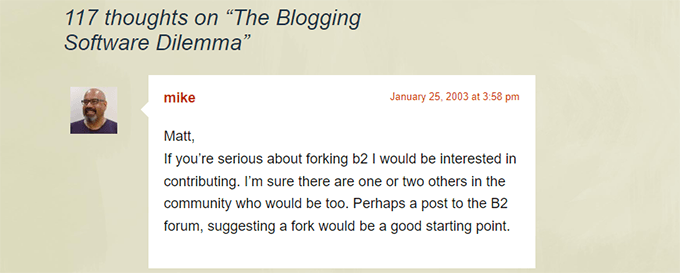
The two of them got to work together and released the first version of WordPress on May 27, 2003.
It became an instant hit among the users of b2/cafelog who started adopting it. Other folks began joining the development. And that’s how WordPress.org got started.
Source: The Complete History of WordPress
The Arrival of WordPress.com
WordPress.org co-founder Matt Mullenweg’s company Automattic launched WordPress.com for beta testers on August 8, 2005. It was later opened for signups on November 21, 2005.
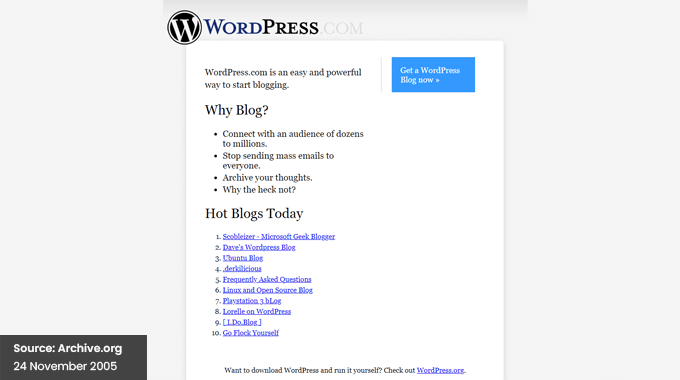
WordPress.com uses open-source WordPress core software and offers a hosted solution to users who want to try out WordPress but don’t want to host it themselves.
The launch of WordPress.com helped the engineering team, along with the rest of the WordPress community, learn how WordPress core software can be scaled for a massive number of users.
WordPress.com is a for-profit company. Like many other WordPress companies, they use open-source WordPress to create products and services.
However, their usage of the WordPress name raised questions about the ownership of WordPress.org, the open-source project.
Ownership of the WordPress Trademark
Automattic, founded by WordPress co-founder Matt Mullenweg, filed the trademark registration for WordPress and the WordPress logo on March 1, 2006.
Trademarks are important for businesses, organizations, and for open-source projects.
Free software licenses like GPL (used by WordPress.org) only protect the terms under which a program can be distributed, but they don’t grant trademark rights.
Automattic, holding the trademark, protected the WordPress project.
As a company, it had the money and resources to register and protect the trademark, which the open-source project didn’t have.
However, in order to safeguard the open-source project, the trademark ownership was transferred to the WordPress Foundation in September 2010.
Unlike Automattic, the WordPress Foundation is a non-profit organization. Its mission states:
The point of the foundation is to ensure free access, in perpetuity, to the software projects we support. People and businesses may come and go, so it is important to ensure that the source code for these projects will survive beyond the current contributor base, that we may create a stable platform for web publishing for generations to come.
WordPress Foundation
The transfer of trademark ownership to the foundation ensured that the open-source WordPress.org project would continue to run even if Automattic and WordPress.com were sold to a different company.
However, as part of the ownership transfer, WordPress.com was granted the right to use the WordPress trademark in its name but not for any future domains.
Matt Mullenweg was granted the license to use the trademark for WordPress.org and WordPress.net websites which are owned by him personally.
To summarize, the WordPress trademark is owned by the WordPress Foundation.
However, WordPress.com is given exclusive permission to use the trademark in its name. That doesn’t mean WordPress.com owns WordPress.
Further reading: Who Owns WordPress and How Does It Make Money?
What’s the Relationship Between WordPress.com and WordPress.org?
WordPress.com and WordPress.org are two different projects that benefit from each other greatly.
As a company, Automattic, the company behind WordPress.com, donates significant resources and manpower to the development of the WordPress.org open-source project.
On the other hand, they benefit from the WordPress code used in their services and products, not to mention the advantage of having WordPress in their name. This lets them borrow the good reputation and recognition of the open-source software.
However, it is important to note that WordPress.com or Automattic are not the only companies benefiting from WordPress.org.
Thousands of other businesses are selling products and services based on the WordPress.org code.
Our partner companies offer a number of premium WordPress plugins and tools. We give back by contributing to the open source project and sponsoring contributors.
The open-source, free software license grants those permissions to anyone who wants to use the software, even commercially.
How Does WordPress.org Benefit From Automattic and WordPress.com?
Automattic, the company behind WordPress.com, sponsors 105 contributors to the open-source WordPress.org project.
These contributors spend a total of 3,799 hours per week across 22 teams. (Source: Five for The Future)
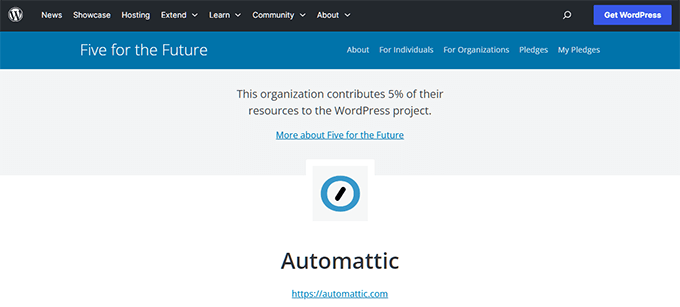
They help contribute code, translations, documentation, support, marketing, testing, and more.
Each new WordPress release contains significant contributions from contributors who are sponsored by Automattic.
Matt Mullenweg himself, the CEO of Automattic, also spends a significant amount of his time contributing to the open-source WordPress project.
How Do Automattic and WordPress.com Benefit From WordPress.org?
The most significant benefit is that WordPress.com has the right to use WordPress in its name.
It helps them borrow the reputation of the open source project for their brand, which helps them sell more products and services.
They also use open-source WordPress code on their WordPress.com platform.
However, WordPress.com is not the only product that uses or relies on the WordPress.org code. Here are some of their other notable products that benefit or rely upon the WordPress.org code:
- WooCommerce – The world’s leading eCommerce platform that runs on top of WordPress as a plugin.
- WordPress.com Apps – Mobile apps that allow users to manage their WordPress.com blogs but can also be used to manage WordPress.org blogs.
- Jetpack – A suite of add-on features combining the functionality of several WordPress plugins.
- JetPack Mobile Apps – A replacement for the WordPress.com apps, allowing users to manage their WordPress websites on mobile. It requires the Jetpack plugin to be installed.
- Akismet – The leading antispam WordPress plugin.
- WP VIP – WordPress development agency targeting enterprise clients.
Why Is There a Naming Confusion Between WordPress.com and WordPress.org?
Many beginners who want to make a website come across WordPress as the #1 recommended choice.
Now, if they Google WordPress, then they will find WordPress.org and WordPress.com.
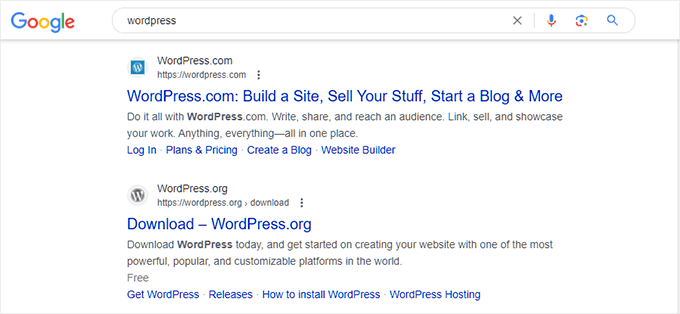
Generally, a .com website is considered official in most cases. However, in this scenario, WordPress.org is the official one.
Another reason for the confusion could be the booths at WordCamps or other tech events where WordPress.com / Automattic booths and WordPress foundation booths could look very similar.
This confuses new users.
A lot of users end up signing up for WordPress.com. However, after a while, they realize the limitations of WordPress.com.
There is an option to pay for upgrades on WordPress.com, but switching to a self-hosted WordPress.org is much cheaper and more flexible for most users.
Quick Summary of Similarities Between WordPress.com vs. WordPress.org
Here is a quick summary of the similarities between the two platforms.
| Similarities | Description |
|---|---|
| WordPress in Name | Both platforms use WordPress in their name. |
| Ease of Website Creation | They both allow users to make websites easily. |
| Use of WordPress Software | WordPress.com and WordPress.org both use the WordPress open-source software. |
| Matt Mullenweg’s Involvement | Mutt Mullenweg is the CEO of Automattic (behind WordPress.com) and also the co-founder of WordPress.org |
| Mutual Benefits | Matt Mullenweg’s involvement |
| Community Support | Both benefit from and contribute to the WordPress community. |
For a more in-depth discussion of each platform’s differences and pros and cons, take a look at our WordPress.com vs. WordPress.org comparison.
Which One Is Right for You?
We recommend WordPress.org as the perfect platform for most users. It gives you access to the full capabilities of the free WordPress.org website builder.
Why we recommend WordPress.org:
- It gives you access to all features of WordPress website builder out of the box.
- You can use it to create any kind of website you want, including eCommerce stores.
- Install any WordPress plugin or theme you need.
- Complete ownership and control of your website. You can take it to a different hosting company, shut it down, own all your data, and more.
For a detailed overview, look at our comprehensive WordPress review with its advantages and disadvantages.
On the other hand, WordPress.com offers a customized website hosting service based on WordPress core software. You don’t have to worry about managing software, installing updates, and security. Plus, you can get 50% off your first year of WordPress.com hosting with our coupon code WPB50 .
Additionally, you can pay for upgrades to use a custom domain, remove ads, install any themes you want to use, or move to an eCommerce plan to set up a store.
However, this also means you don’t get access to all the features that a self-hosted WordPress website offers.
For example, with WordPress.org, you can start with Bluehost for a discounted price of $1.99 / month and a free domain name.

At that price, you get a free domain, full control of WordPress, the ability to install any theme or plugins, and even use it for eCommerce.
And Bluehost is not the only provider. You can choose any of the top WordPress hosting providers, like Hostinger and SiteGround, and get the same flexibility.
We hope this article helped you understand the relationship between WordPress.com and WordPress.org. You may also want to see our article on the history of blogging or our expert pick of the must-have WordPress plugins to grow your website.
If you liked this article, then please subscribe to our YouTube Channel for WordPress video tutorials. You can also find us on Twitter and Facebook.





Dennis Muthomi
That trademark section is very interesting. I myself struggled with the decision between the two back in the day when I was starting out and appreciate you breaking it down for people who are in that situation. One more tip I would add is to think long term when deciding between the two. If you think you’ll need extensive customization or plan to monetize your site in the future, go with WordPress.org from the start.
John Blackbourn
Syed, I believe this article is incorrect regarding the ownership of WordPress.org. Matt Mullenweg owns WordPress.org and is granted a license to use the trademark for it (along with WordPress.net). It is not owned by the foundation. It’s not easy to find a primary source on this topic, but it’s mentioned on this WordPress Book page:
> The WordPress Foundation was launched in January 2010. Automattic transferred the trademarks later that year in September. As part of the transfer, Automattic was granted use of WordPress for WordPress.com, but not for any future domains. Matt was granted a license for WordPress.org and WordPress.net.
Matt has verbally stated in the past that he is the owner of the domain (most recently his Spaces interview yesterday) but I’ve not found anything in writing to back this up.
Editorial Staff
Thank you John. We have updated the article to reflect the correction.
Admin
Mrteesurez
We appreciate this information regarding the two products. Matt has really done a great job and lead the foundation well.
Because of trademark issue, I can see many WordPress resource sites or products only use “WP” in their domain names, WPbeginner included. Thanks, this is an insighful article that shed light on some confusions.
Moinuddin Waheed
Very informative and insightful article regarding wordpress dotcom and WordPress dotorg confusion.
it is good to know that the founder of both the WordPress is Matt Mullenweg himself.
Such a fantastic job that he registered wordpress foundation to make sure wordpress remains available open source for generations to come.
Great respect for this man and thousands of contributors around the world to make such fantastic products and make available as open source.
Illonda
I began writing a few years ago on wordpress.com. However, upon reading this I’m thinking should I move to wordpress.org because I desire to be recognized and turn my writing into a business through other creative ideas. And if so can I transfer my page and writings already published from wordpress.com to wordpress.org?
Michelle Barrios
It’s 2020 and this article is from 2013 and it’s the clearest about this issue. Thank you very much!
It’s perfectly normal to think that they are all associated if the logos of .com and .org are exactly the same and the brands are one next to the other at a fair, as you have shown in the photos.
WPBeginner Support
Glad you’ve found our guide helpful
Admin
Frances A. Garcia
This was a very helpful article. I have a blog site with wordpress.com and I am looking to migrate to wordpress.org. I would like to know if I have to pay the registration of my domain and the Premium Plan that I have at wordpress.com. May I switch the domain?
WPBeginner Support
Hi Frances,
You will have to pay for the WordPress hosting. Once you have moved your website, you will change the domain name settings and point them to your new hosting provider. You can choose to keep your domain name at WordPress.com and manage it from there.
Admin
Gary
I was looking into the collaboration of Automattic and wordpress.org to see if Automattic has power over it. I noticed that over at the WordPress.org site, their theme review team seems to have been taken over by an Automattic employee named Tammie Lister and was wondering how that can happen if the two are separate. Regardless if it’s Tammie or another from Automattic, do they have say as to what happens at .org ?
Editorial Staff
Hey Gary,
While in theory Automattic as a company doesn’t have any power over WordPress.org, the CEO and founder of Automattic is Matt Mullenweg who’s also the chairman of the WordPress foundation (which handles everything related to WordPress.org). I will let you come to your own conclusion there.
Having that said, the list of Theme Review team is listed here:
https://make.wordpress.org/themes/handbook/about/
Out of the 6 Active Admins, only 1 is an Automattic Employee (Tammie Lister).
Also if you look at the Make WordPress page for Themes, you will see that no one person has taken over and other admins like Chip, Emil, etc are just as active.
https://make.wordpress.org/themes/
Hope this answers your question
-Syed
Admin
Myrna
Thank you for this excellent explanation. I thought self hosting would be much more complex and now I see that it’s not the right way to go. I do have a lot to learn though before I can contemplate creating my site.
Vishesh Kachheda
Hmmm…
Nice post, very useful for newbies!
Pamela
I still have one question. I started one blog through WP.com and moved it to self-hosted. Another blog was begun self-hosted.
Yet every year, I get an email from WP with my annual stats. I access it for one blog using the original WP.com sign in. But how do I get the annual stats for the site that has always been self-hosted? If the two WPs have nothing to do with each other, I wouldn’t expect to get a stats email for the always self-hosted blog.
Editorial Staff
If you are using WordPress.com Stats or Jetpack plugin, then you connect your site with WordPress.com (thus giving them access to your data). This is how they can send you those annual stats email.
Admin
Jeannette Paladino
I’m often asked why a self-hosted WordPress.org website. I now have a thorough explanation for them. There is also a lot of confusion when you mention WP because people think “blog.” And many organizations still do link their non-WP site to a WP blog (a blog is simply an article, another point of confusion). However, as you mention in your post, WordPress.org IS a content management system that functions as a website. It’s difficult for newcomers to understand this. Thanks for this very informative post.
Editorial Staff
Glad to help Jeannette. Thanks for dropping by and commenting
Admin
Mathew Stephen
OK:) But the logo? Both looks same… Only Color Difference is there… No legal problems?
Editorial Staff
No there are no legal issues. Here is the history that will explain:
The WordPress trademark was first registered by Automattic parent company of WordPress.com (remember both WordPress.com and WordPress.org was started by Matt Mullenweg). To keep controversy out, and really make WordPress (open-source), the WordPress foundation was established by Matt. The trademark was then donated to the WordPress foundation. WordPress.com is the only business that is allowed to use WordPress in their domain name.
Admin
Jessica Klassen
The part about this that confuses me is when you say “WordPress.com is the only business that is allowed to use WordPress in their domain name.” Isn’t WordPress.org using WordPress in the domain name??
Widdershins
Hm-m … that explains a lot! … thanks
shane
The thing about using Wordpress.com for me is the community behind it. If you just love to write, and you love to read other blogs, wordpress.com is great because it kind of puts you in connection with other bloggers.
Of course, as the post says- you can’t modify the blog and not really monetize it either (at least with ads) and you are only allowed so much drive space for content.
But if you just want to write and have other fellow bloggers easily come across your posts, Wordpress.com isn’t bad for free.
Editorial Staff
Nope definitely not bad for free. It just depends on what you are using it for, and what are your future goals. As your site grow, you can always move.
Admin